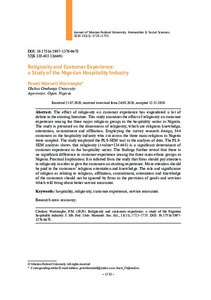Religiosity and Customer Experience: a Study of the Nigerian Hospitality Industry
Скачать файл:
URI (для ссылок/цитирований):
https://elib.sfu-kras.ru/handle/2311/137743Автор:
Worimegbe, Powel Maxwell
Уоримегбе, П.М.
Дата:
2020-11Журнал:
Журнал Сибирского федерального университета. Гуманитарные науки. Journal of Siberian Federal University. Humanities & Social Sciences;2020 13 (11)Аннотация:
The effect of religiosity on customer experience has engendered a lot of debate in the existing literature. This study examines the effect of religiosity on customer experience among the three major religious groups in the hospitality sector in Nigeria. The study is premised on the dimensions of religiosity, which are religious knowledge, orientation, commitment and affiliation. Employing the survey research design, 544 customers in the hospitality industry who cut across the three main religions in Nigeria were sampled. The study employed the PLS-SEM tool in the analysis of data. The PLS-SEM analysis shows that religiosity (t-value=134.668) is a significant determinant of customer experience in the hospitality sector. The findings further reveal that there is no significant difference in customer experience among the three main ethnic groups in Nigeria. Practical Implication: It is inferred from the study that firms should pay attention to religiosity in order to give the customers an exciting experience. More attention should be paid to the customers’ religious orientation and knowledge. The role and significance of religion as relating to religious, affiliation, commitment, orientation and knowledge of the customers should not be ignored by firms in the provision of goods and services which will bring about better service encounter В существующей литературе представлены спорные мнения о влиянии религиозности на качество обслуживания клиентов. В данном исследовании
рассматривается влияние религиозности на качество обслуживания клиентов, представляющих три основные религиозные группы в секторе гостеприимства в Нигерии. Исследование основано на аспектах религиозности, которые включают в себя
религиозное знание, ориентацию, приверженность и принадлежность. В исследовании приняли участие 544 клиента из отрасли гостеприимства, которые представляли три основные религии в Нигерии. Для анализа данных применялся PLS-SEM.
Анализ PLS-SEM показывает, что религиозность (t-значение
= 134,668) является
существенным фактором, определяющим уровень удовлетворенности качеством
обслуживания клиентов в секторе гостеприимства. Результаты также показывают,
что между тремя основными этническими группами в Нигерии нет значительных
различий в восприятии клиентами качества обслуживания. Исследование выявило, что компаниям необходимо обращать внимание на религиозность, чтобы уровень удовлетворенности клиентов качеством обслуживания был высоким. Больше
внимания следует уделять религиозной ориентации и знаниям клиентов. Фирмы
не должны игнорировать роль и значение религии для клиентов при предоставлении товаров и услуг, что приведет к улучшению качества обслуживания

